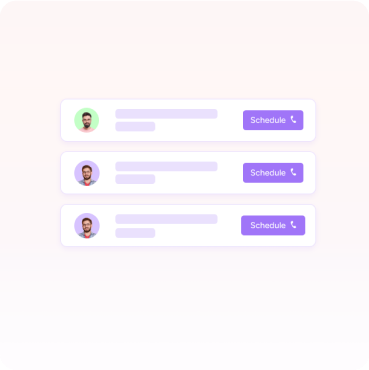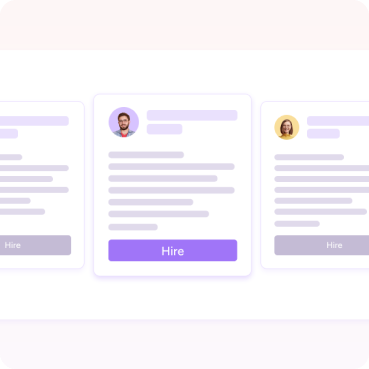Regular hiring
High RiskHire Swift Developers of Silicon Valley caliber
Hire pre-vetted full time remote Swift Developers from India. Hire now and build your dream engineering team with Hyno
Join 4,000+ companies already growing








Our Top Remote Developers
Hyno conducts rigorous testing and carefully vets the developers who are fueled by passion and skill sets. Hence, our developer community is the foundation for innovation and collaboration, bringing ideas and projects to fruition.
OUR STANDARDS
Hyno vs. Your regular recruitment process.
Find a risk-free, pre-interviewed, high-quality developer who is remote-ready in less than 2 weeks at 40% less cost.
Parameters
Choose the right for your firm.Time
Fees
Quality
Pre Screening
Remote readiness check
Termination
Failure rate
1 - 4 Months
> $1000
High
Low
Freelancing
High Risk1 - 2 Months
No fee
No
Very high
 Low Risk
Low Risk
0 - 15 Days
No fee
No
Very low
Pricing Starts from $35/hr
Accomplishing everything in just 3 steps
Our technical manager aligns the required skillset and tech stack with our talent pool to help you find the best fit.

Shortlisting candidates
Precise Hiring: Understanding, Gathering, and Shortlisting nittygritty.
-
 We start by thoroughly understanding your unique needs and specifications.
We start by thoroughly understanding your unique needs and specifications.
-
 check markWe
align the developer details with company goals. This way, we tailor the candidate
selection to seamlessly integrate with the organization’s vision and goals.
check markWe
align the developer details with company goals. This way, we tailor the candidate
selection to seamlessly integrate with the organization’s vision and goals.


Scheduling an Interview
Effortless talent selection: Finding your perfect match
-
 We connect you with the chosen candidates to ensure a personalized experience.
We connect you with the chosen candidates to ensure a personalized experience.
-
 Our rigorous
selection process guarantees that you find candidates who align seamlessly with your
requirements.
Our rigorous
selection process guarantees that you find candidates who align seamlessly with your
requirements.


Onboarding the talent
Streamlined onboarding for peak performance.
-
 The selected/qualified talent integrates smoothly through structured onboarding to
quickly adapt to projects, processes, and team dynamics.
The selected/qualified talent integrates smoothly through structured onboarding to
quickly adapt to projects, processes, and team dynamics.
-
 We go beyond
integration to offer ongoing support for a seamless transition to ensure that the
new talent exceeds your expectations.
We go beyond
integration to offer ongoing support for a seamless transition to ensure that the
new talent exceeds your expectations.


Read hiring guide
A one-stop shop to hiring the right Swift Developer
How to hire a Swift Developer? Skills to look for, interview questions, and more
Hiring a dedicated developer for your business can
be a cumbersome task. As many companies are competing to hire top Swift
developers,
so finding a good developer is not as easy as it may seem.
We're here to assist all employers who choose to hire Swift Developer on their
own. Recruiting a developer on your own requires a fair amount of software
development experience in general. However, if you're a non-technical manager
interested in learning more about how to hire a Swift Developer, we've put up
an excellent resource for you.
Things to check Key Skills Required for a Swift Developer?
The following are the key skills that a developer should possess to become proficient in Swift:
1. Swift Programming Language: Check if the developer is proficient in Swift programming language and is familiar with its syntax and features.
2. iOS Development: Check if the developer has experience in developing iOS applications, including familiarity with Xcode, iOS SDK, and iOS frameworks.
3. Object-Oriented Programming (OOP): Check if the developer has a good understanding of object-oriented programming principles and practices, such as inheritance, polymorphism, and encapsulation.
4. Debugging and Troubleshooting: Check if the developer has the skills to debug and troubleshoot issues in code, such as using debugging tools and analyzing logs.
5. RESTful APIs: Check if the developer has experience in working with RESTful APIs and can integrate them into iOS applications.
6. Git Version Control: Check if the developer is proficient in using Git for version control and can collaborate effectively with other team members using Git.
7. Agile Development: Check if the developer has experience in working in an Agile development environment and is familiar with Agile methodologies such as Scrum or Kanban.
8. Design Patterns: Check if the developer has knowledge of design patterns commonly used in iOS development, such as MVC, MVVM, and VIPER.
9. Core Data: Check if the developer has experience in working with Core Data, which is a framework for data storage and management in iOS applications.
10. Memory Management: Check if the developer has knowledge of memory management techniques in Swift, such as reference counting and ARC (Automatic Reference Counting).
Ideal Hiring Process for Swift Developer
1. Define the role and requirements: Determine the specific job role and responsibilities, as well as the required skills, experience, and qualifications for the position. This will help you create a clear job description to attract suitable candidates.
2. Source candidates: Advertise the job opening on job boards, LinkedIn, and other social media platforms. You can also ask for referrals from your network or use recruitment agencies to source candidates.
3. Screen resumes: Screen resumes to identify candidates who meet the minimum qualifications for the job, such as experience with Swift, iOS development, and other relevant technical skills.
4. Conduct initial interviews: Conduct initial interviews with selected candidates to assess their communication skills, work experience, and fit for the role. This can be done via phone or video call.
5. Technical assessment: Administer a technical assessment to test the candidate's coding skills and ability to solve problems using Swift. This can be done remotely using coding platforms such as HackerRank, Codility, or LeetCode.
6. Follow-up interviews: Schedule follow-up interviews with top candidates to dive deeper into their skills, experience, and working style. This can be done using video conferencing tools such as Zoom or Skype.
7. Reference checks: Conduct reference checks with previous employers to verify the candidate's skills, experience, and work ethic.
8. Offer and onboarding: Once you've selected the right candidate, make a job offer and onboard them by providing necessary resources, access to company tools, and other relevant training materials.
9. Performance management: Ensure regular communication and performance management to support the remote developer in their role and to ensure they meet company expectations.
Important Interview questions to ask to Hire a Swift Developer
What's your experience with Swift programming language?
I've been working with Swift for the past three years and have completed several projects using it. I am proficient in its syntax, features, and best practices.
How do you keep up with new developments in the iOS development ecosystem?
I regularly read blogs and attend conferences to keep up-to-date with the latest iOS development trends and technologies. I also participate in online developer communities to share knowledge and learn from others.
What is the difference between a value type and a reference type in Swift?
A value type is a type of variable that holds a value directly, while a reference type is a type of variable that holds a reference to a memory location where the value is stored. Examples of value types in Swift include structs and enums, while classes and closures are examples of reference types.
Can you explain how delegates work in iOS development?
Delegates are a design pattern used in iOS development to enable communication between objects. An object delegates a task or responsibility to another object and the delegate object executes the task and communicates back to the original object. It's commonly used in UIKit for events like button taps or table view selection.
What are the pros and cons of using MVC architecture in iOS development?
The Model-View-Controller (MVC) architecture is commonly used in iOS development as it separates the different components of an application and enables easier maintenance and scalability. However, it can result in large, complex view controllers and can make it harder to reuse code across different parts of the application.
How do you debug issues in a Swift codebase?
I use Xcode's debugger, breakpoints, and console logs to debug issues in a Swift codebase. I also use third-party tools like Fabric or Crashlytics to identify crashes and issues in the codebase.
Can you explain the concept of memory management in Swift?
Swift uses Automatic Reference Counting (ARC) to manage memory. This means that objects are automatically deallocated when there are no more references to them. It's important to understand how to manage strong and weak references to avoid memory leaks in Swift applications.
How do you ensure your code is maintainable and scalable?
I follow best practices for code organization, use of design patterns, and testing. I also document my code and write self-explanatory code to make it easier for others to understand and maintain.
How do you approach working with RESTful APIs in iOS development?
I use libraries like Alamofire or URLSession to communicate with RESTful APIs. I also ensure proper error handling and caching to improve performance and reliability.
Can you describe a project you worked on and what challenges you faced during development?
In my last project, I was responsible for building a custom video player for an iOS app. One of the biggest challenges was to ensure seamless playback across different devices and network conditions. I used adaptive bitrate streaming and buffering techniques to overcome these challenges.
Job Description Template for Swift Developer
Location: [Insert Location]
Job Title: Swift Developer
Position Type: Full-Time
Salary: [Insert Salary Range]
We are seeking a skilled Swift developer to join our team and contribute to the development of our iOS applications. The ideal candidate will have experience with Swift, as well as a strong understanding of iOS development best practices and app architecture.
Key Responsibilities:
- Develop new features and enhancements for our existing iOS applications using Swift and other iOS development technologies.
- Collaborate with cross-functional teams to design and implement new features.
- Write maintainable and testable code that meets the high-quality standards of our development team.
- Optimize applications for performance, scalability, and user experience.
- Stay up-to-date with the latest iOS development trends and technologies.
Requirements:
- At least [insert number] years of experience with Swift and iOS development.
- Strong understanding of iOS app architecture and design patterns such as MVC, MVVM, or VIPER.
- Experience working with APIs and third-party libraries.
- Knowledge of software engineering best practices, including testing and version control.
- Strong problem-solving skills and ability to work collaboratively in a team environment.
- Strong communication and interpersonal skills.
- Bachelor's degree in Computer Science, Engineering, or related field.
Bonus Skills:
- Experience with SwiftUI or Combine.
- Familiarity with cross-platform frameworks like React Native or Flutter.
If you meet the requirements and have a passion for Swift programming, we'd love to hear from you. Apply today to join our growing team of talented developers.